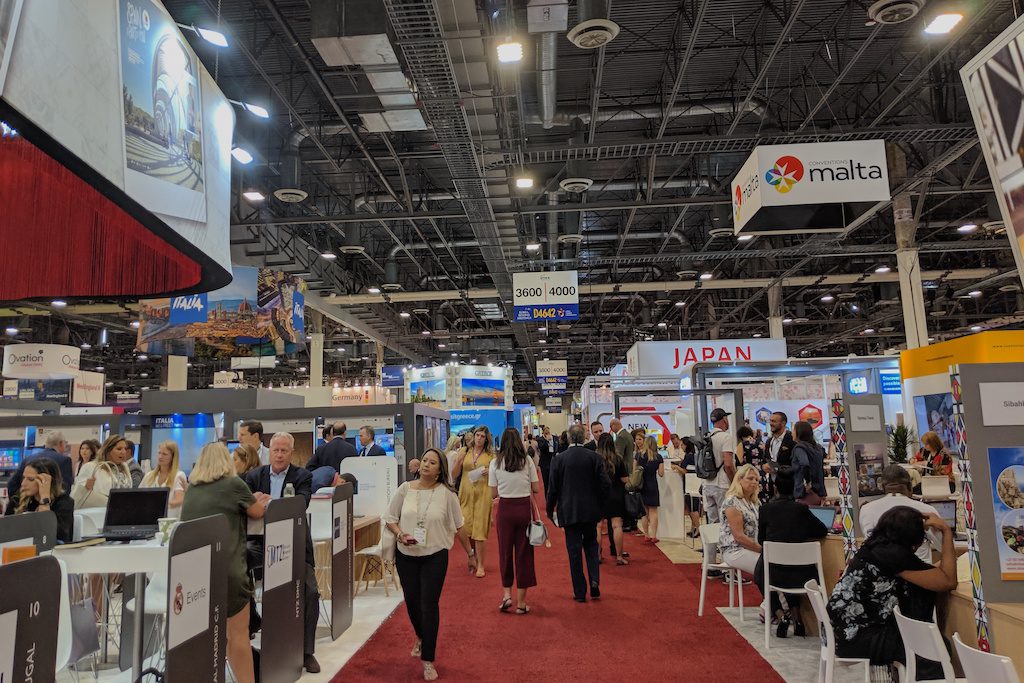Events Sector Feels Poised for Tech Explosion

Skift Take
There is no shortage of faith in the events industry. Rising investment and tech advancements have set the lucrative sector up for a strong future.
At IMEX America in Las Vegas last week, optimism among the 13,000 attendees was high, with organizers looking at a healthy industry that still has a lot of potential. This feeling was amplified at the largest U.S. event for meeting planners by a growing sense that engagement among attendees may not be as challenging to track as originally thought. In recent years, investment in event technology has taken off, with startups like Fever and Interprefy receiving millions in funding.
Michael Burns, global head of sales and marketing for Aventri, an event software company, said that technology for events had grown rapidly in the past few years, but that the industry itself had not quite caught up yet.
In particular, technology that can track engagement such as Bluetooth and Wi-Fi can give planners a much clearer picture of what attendees are interested in and what companies need to change. Virtual reality can help planners scope out venues, and facial recognition can help with registration and check in.
Meanwhile, adoption of this sort of technology remains so low that performance metrics for the industry have yet to be established. Right now, companies first need to do the most basic thing, and that is simply gather the data. For years, events were a “black box,” according to Burns, and only now are companies realizing how much information they can glean from them.
“If we take all of the corporations that are running events, 100 percent of them are [using tech to track return on investment] -- just not for events,” he said. “They know how to use these strategies, but we’re not seeing the alignment between the event team and the rest of the business.”
That being said, he believes that the events industry will soon have its moment.
“In the next five years I think it’s going to explode,” he said. “We’re in the early adopter phase. And this is just the next stage. I think it’ll become less of a conscious decision, and it will just get incorporated into what people now do to measure their sales and marketing.”
Gerardo Tejado, general manager for American Express Meetings & Events, said that not many planners were using more advanced technology yet, but that he expected it to take off within the next year. The company launched The Meetings Marketplace, a meetings technology platform, in November, where it partners with other businesses to provide services to track engagement.
Global Tensions
Another hot topic among the industry was the various global tensions affecting the world of travel, such as Brexit, the trade spat between the U.S. and China, and the upcoming U.S. presidential election.
In general, planners acknowledged that these issues were troubling for the events industry, contributing to uncertainty among corporations, and leading them to potentially travel less, plan fewer events, and spend less on events overall. Skift has already documented a drop in group bookings affecting parts of the hospitality sector, in large part due to political and economic tensions.
“In the U.S., I see this not changing until the elections, because I think there is definitely this concern of where things are heading,” said Catharine Chaulet, CEO of Global DMC Partners, a network of destination marketing companies. “The trade tensions between China and the U.S. — even trade tensions between the Europe and the U.S. — means that there's a level of uncertainty.”
Despite this, planners were overall very hopeful about the future. American Express Meetings & Events released its 2020 Global Meetings Forecast report at IMEX, where it highlighted that people were “notably more optimistic than they have been in recent years” about the future of events.
They have good reason to be. The report predicts that spend in every region will be up in 2020: Central and South America was up 2.6 percent, Europe was up 2.1 percent, North America was up 1.6 percent, and Asia Pacific was up 1.3 percent. The report also predicted that meetings would increase in frequency in 2020, and would last longer.
Sherrif Karamat, president and CEO of the Professional Convention Management Association, was also optimistic. He said that the complications arising from issues like Brexit meant more planning and more work, but that the industry was up for the challenge.
“I believe that because the world is so much more connected, events are logically growing,” he said. “But these issues are creating more complexity for event organizers. There are all of these extra considerations that go into planning an event. You have to simplify it for your delegates, regardless of what the complexity might be. So I’m not seeing fewer events. Rather, I’m seeing that more planning has to go into trying to make it happen.”




